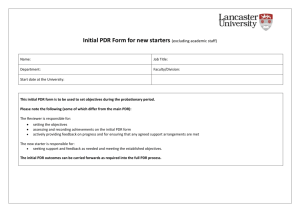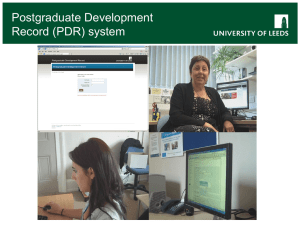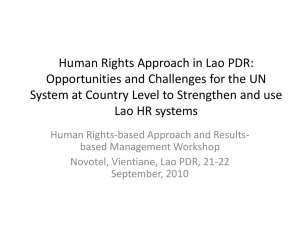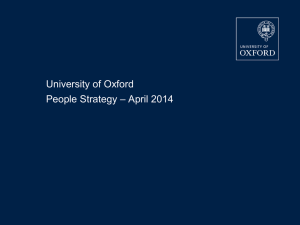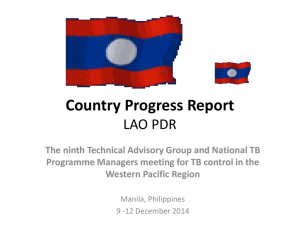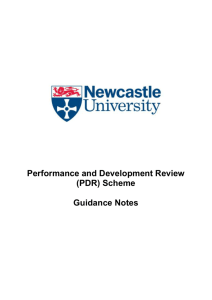Draft guidance to departments on implementing performance review
advertisement
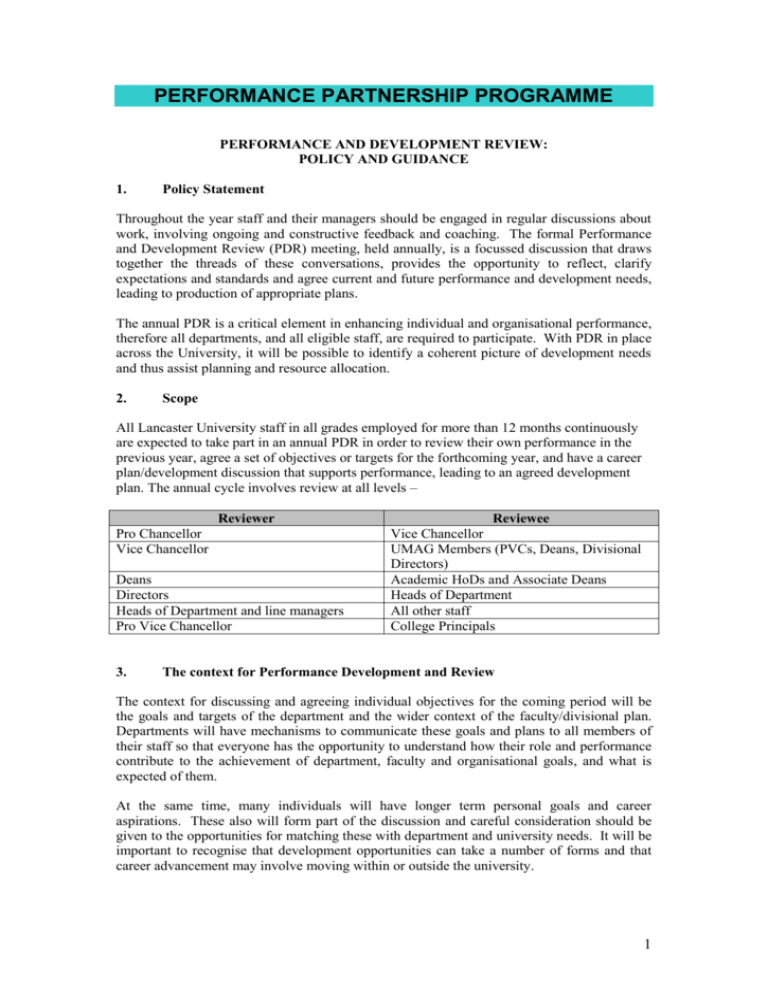
PERFORMANCE PARTNERSHIP PROGRAMME PERFORMANCE AND DEVELOPMENT REVIEW: POLICY AND GUIDANCE 1. Policy Statement Throughout the year staff and their managers should be engaged in regular discussions about work, involving ongoing and constructive feedback and coaching. The formal Performance and Development Review (PDR) meeting, held annually, is a focussed discussion that draws together the threads of these conversations, provides the opportunity to reflect, clarify expectations and standards and agree current and future performance and development needs, leading to production of appropriate plans. The annual PDR is a critical element in enhancing individual and organisational performance, therefore all departments, and all eligible staff, are required to participate. With PDR in place across the University, it will be possible to identify a coherent picture of development needs and thus assist planning and resource allocation. 2. Scope All Lancaster University staff in all grades employed for more than 12 months continuously are expected to take part in an annual PDR in order to review their own performance in the previous year, agree a set of objectives or targets for the forthcoming year, and have a career plan/development discussion that supports performance, leading to an agreed development plan. The annual cycle involves review at all levels – Reviewer Pro Chancellor Vice Chancellor Deans Directors Heads of Department and line managers Pro Vice Chancellor 3. Reviewee Vice Chancellor UMAG Members (PVCs, Deans, Divisional Directors) Academic HoDs and Associate Deans Heads of Department All other staff College Principals The context for Performance Development and Review The context for discussing and agreeing individual objectives for the coming period will be the goals and targets of the department and the wider context of the faculty/divisional plan. Departments will have mechanisms to communicate these goals and plans to all members of their staff so that everyone has the opportunity to understand how their role and performance contribute to the achievement of department, faculty and organisational goals, and what is expected of them. At the same time, many individuals will have longer term personal goals and career aspirations. These also will form part of the discussion and careful consideration should be given to the opportunities for matching these with department and university needs. It will be important to recognise that development opportunities can take a number of forms and that career advancement may involve moving within or outside the university. 1 4. Departmental organisation of Performance and Development Review The review year runs from 1 August to 31 July. Faculties/Divisions and their departments have flexibility within this timeframe to schedule their cycle of PDR’s. The Dean/Director and their HR Partner will assure an appropriate timetable for each area with a standing item on Faculty PRC and Divisional management team meetings on PDR at the start of each PDR cycle. Heads of Department are responsible for establishing a timescale for undertaking PDR meetings, identifying reviewers, allocating appropriate reviewers to reviewees, ensuring that eligible staff have a performance and development review meeting within the designated timeframe and that records of meetings are kept and documents are treated within defined limits of confidentiality. To assist planning, the HR Department will provide a breakdown of staffing by name and staff group. Where a large number of identical roles are managed by a single manager, it may be appropriate to undertake some aspects of the formal PDR through a team approach. For instance, a set of common objectives may be set for a team, and individual reviews carried out in the light of these. The Dean/Director together with the HR Partner will identify such situations. Departments may find it useful to undertake a review of team goals, prior to commencing individual reviews. Further information and guidance on involving the team in objective setting can be found here When the review round has been completed Heads of Department will give feedback on its outcomes to the Dean/Director (see 13 below). The HR Partners will have a key role in providing information, support and advice in these processes. 5. Selection of reviewers In non-academic departments, the reviewer will be the individual’s immediate line manager. Where a member of staff reports to more than one person within the same department the Head of Department will identify one reviewer for that individual. In many academic departments it may not be feasible for the Head of Department alone to conduct all the reviews. In such circumstances, the Head of Department may identify a pool of suitable reviewers, who must be trained for this role. Good practice suggests that a reviewer should be responsible for reviewing no more than 8 staff, but circumstances and needs will vary from area to area. The reviewer should be someone who: For performance review - is able to provide meaningful feedback on that person’s performance (and behaviour) and has sufficient knowledge of the individual’s general area of work; For objective setting - has sufficient knowledge and understanding of the needs, priorities and resources of the department and the individual’s role; For development planning – has the knowledge as stated above and authority to make commitments. It is essential that the HoD agrees with the reviewers the extent of their authority to agree individual objectives and make commitments on behalf of the department, before reviews 2 take place. It is recommended that HODs hold a briefing session with reviewers before the process starts to confirm these details and afterwards, when the reviews are completed, to feedback and agree who is to take forward actions and how. The Dean/Director will approve the list of proposed reviewers for each department. In exceptional circumstances an individual may request of the HOD, giving reasons, an alternative reviewer noting however the expectation that the line manager in non-academic departments will be the reviewer. The HOD will carefully consider and decide on such requests in consultation with their HR Partner. 6. Documents The PDR forms are designed to be simple and useable. The emphasis in the PDR scheme is on a rich conversation with meaningful outcomes; the forms are designed to record the conversation and agreed actions. The PDR form includes: 7. self-evaluation and feedback on performance on the preceding 12 months outcomes summary including objectives or targets for the coming 12 months personal development plan and personal career aspirations The Performance Review Discussion Input to the performance review: will include the previous year’s objectives and development plan may include role description, changes to role and/or context, feedback from established mechanisms such as student reviews, peer review and relevant Academic Discipline Profile. Further information on these and other forms of input to the review for academic staff is available here. As the PDR meeting will build on regular formal and informal discussions about expectations and performance throughout the year, it should contain no surprises for the reviewee. The review discussion will: provide constructive and respectful feedback draw on information, evidence and examples allow reflection focus on actions and outcomes be honest 8. Objective or target setting and review The nature of the objectives or goals for individuals or teams will vary according to, and should reflect, the individual’s role and targets or priorities of their department. They should be agreed following discussion. Objectives should always be based on the SMART principles, so that each is specific, measurable, achievable, relevant and time-bound. PDR is a dynamic process in which reviewers and reviewees must be prepared to review and adjust goals if necessary during the year. Where changes are significant, they will be recorded as they occur. For further information and materials on objective setting including sample objectives, please go to 3 http://www.lancs.ac.uk/hr/recruitment/pdr/files/supporting_pdr.doc/#setting 9. Development planning Development plans will be tailored to each individual. They will clearly identify development actions, resource implications, timescale and responsibilities. For further information and sample development activities and plans, please see http://www.lancs.ac.uk/hr/recruitment/pdr/files/supporting_pdr.doc/#devising 10. Performance Improvement Planning The PDR meeting should never be used as the vehicle to raise for the first time disciplinary or capability issues. Where there is a gap between an individual’s performance level and/or standard of behaviour and the level expected, their manager will work with that person to determine the reasons for the gap and find solutions designed to address it. A separate Performance Improvement Plan should be created which identifies clearly the gap, the actions to be taken by the individual and their manager, including forms of support and development, the timescale for improvement and review dates. For an example Performance Improvement Plan, see http://www.lancs.ac.uk/hr/recruitment/pdr/files/supporting_pdr.doc/#perfimp Where it is necessary to move into formal procedures, the University’s Capability and Disciplinary Procedures will be used to support and manage problems with performance and conduct. These procedures are separate from the PDR process. 11. Performance review and other individual outcomes Work environment and workload should be incorporated into the PDR discussion. For academic staff, sabbatical leave planning and workload allocation will normally take place in the PDR meeting. For staff with a disability, the PDR is an opportunity to review particular needs as they relate to their role and work context. The PDR meeting will also act as a vehicle for discussing planned changes to role and how this might affect role grading and promotion prospects (for academic staff), as well as exceptional performance and how this might be recognised. The discussion can therefore flag up potential cases for reward for consideration; however the PDR and promotion/role evaluation processes are entirely separate. Documents for PDR will not be used as part of a case for promotion or role evaluation without the permission of the reviewee and reviewer. Where rewards and recognition carry resource implications they must be budgeted for within the departmental/faculty budget. 12. Confidentiality The detail of the review discussion remains confidential to the reviewee and the reviewer. The completed review form summarising the outcomes of the review – objectives and actions related to performance, development or career progression, together with any identified organisational issues - will be copied to the head of department (and subsequent HoDs), and be available on request to the Dean/Director and the relevant HR partner to assist with planning at faculty and equivalent levels and to ensure high standards (see Para 15). 13. Outcomes of Performance Development Review for the department When the PDR round has been completed, the Head of Department should review the outcomes documents and provide feedback to the department and the Dean/Director. There 4 will be outcomes for the individual reviewee, the department, and the faculty/division. The feedback should: 14. provide information on numbers and % of staff who have been reviewed highlight any themes or specific issues arising from the exercise (particularly as they relate to departmental/faculty strategy ) identify career development candidates in the light of succession planning identify generic development needs of the department indicate issues to be actioned at departmental level, and those for faculty and university consideration Clinical Appointments and Split Appointments In the case of clinical appointments, Heads of Department will ensure that performance review and objective setting is conducted in a manner that satisfies any particular contractual requirements that apply to clinical staff. Where an individual a) is employed in two departments but these roles are not linked, each employing department will conduct a separate PDR process b) has a split or joint post across two (or more) departments, the Heads of Department will agree which department will take the lead and agree how to collect and share information. 15. Ensuring high standards To ensure consistent and good practice, attendance at a Performance Review training module is a requirement for reviewers – please see here. Should a colleague have concerns regarding their formal PDR meeting that cannot be resolved with their Reviewer or Head of Department, they may refer these concerns to the Dean/Director (or equivalent higher level of management). Additionally the Dean/Director will sample PDR documents to ensure the system is operating fairly, consistently and effectively 16. Exceptional Circumstances Circumstances may arise that prevent a member of staff from participating in the normal PDR round, for example, a member of staff with less than 12 months continuous service, maternity leave, long term sickness absence, transfer to a new role. The Head of Department will deal with these situations on an individual basis. 17. Evaluation and Monitoring Faculties/divisions will evaluate the effectiveness of the process at the end of each round. Feedback from staff may be collected through meetings, focus groups, questionnaires or any combination of these. Actions to be taken as a result of the feedback should be incorporated into faculty/divisional planning for the following year’s review round. The Human Resources department will collect qualitative and quantitative data on participation and effectiveness of the Professional and Development Review scheme at regular intervals via reviewees, Heads of Department, managers and Deans and take appropriate actions based on this information. 5 December 2008 6
